F.C.C. Eliminates Sports Blackout Rule Over N.F.L Objections
A long standing rule is finally repealed, but it's not likely to change your viewing choices.
More than a year after first putting the proposal before its commissioners for consideration, the Federal Communications Commission has eliminated a long standing rule that barred local stations from broadcasting games on local television when home games are not sold out, but it may not have much impact on what football games you can watch:
WASHINGTON — The Federal Communications Commission voted unanimously Tuesday to eliminate its sports blackout rule, which for nearly 40 years has prevented cable and satellite systems from televising some National Football League games.
The move is unlikely to eliminate the league’s attempts to blackout games, which it can do on local broadcast channels when tickets to a game are not sold out. Because of the sport’s soaring popularity, however, only two N.F.L. games were blacked out locally last season.
The N.F.L. strongly opposed the F.C.C. action. But Commissioner Ajit Pai, a Republican, echoed the sentiments of the five the commissioners by saying: “It is not the place of the federal government to intervene in the private marketplace and help sports leagues enforce their blackout policies. It is the commission’s job to serve the public interest, not the private interests of team owners.”
While the N.F.L. and its supporters argued that eliminating the blackout rule would endanger the availability of games on free over-the-air television, members of the F.C.C. staff and commissioners said they believed that was unlikely, in part because the current N.F.L. broadcast contract extends through 2022.
“I hope the N.F.L. will seize on this opportunity to repudiate blackouts,” Tom Wheeler, the agency’s chairman, said.
Decades ago, ticket sales were a much bigger part of an N.F.L. team’s overall income. The league instituted its blackout rule because it wanted to encourage people to pay for a ticket instead of watching free on television. In some markets, games were regularly blacked out on TV.
Now, television rights contribute a majority of teams’ revenue.
The N.F.L., under its agreement with broadcast networks, will still be able to blackout a game on broadcast TV. But because of the F.C.C. vote, a cable provider could show a blacked out game in a market where the broadcast version is blocked.
As I noted when I first wrote about this issue, the argument that eliminating the blackout rule would endanger over-the-air broadcasts of N.F.L. games really doesn’t have very much merit. First of all, as noted, the current contract between the league and broadcasters will be in effect for the next eight years, which means that there’s no danger of the weekly Sunday games leaving CBS, Fox, or NBC. When that contract is up, the end of the sports broadcast rule is only one of the many issues that the N.F.L. and broadcasters will have to deal with in a media market that will likely change significantly from what it is today. If current trends continue for example, and there’s no reason to believe that they won’t, then more and more people will want to consume their media on mobile and other devices other than traditional televisions, many of which bear little resemblance to what we considered televisions a decade or two ago to begin with. More and more people will be looking to “cut the cord” completely and consumer their media over the Internet, for example, and both the N.F.L., the networks, and the companies that advertise during football games will want to capture those eyeballs. Even with those changes, though, it’s likely that many people will still prefer to watch their football the “old fashioned way” even if it is with newer technology that we can’t conceive of just yet. Given that, I suspect that the majority of N.F.L. games after 2022 will still be broadcast on over-the-air stations. Second, the league has already taken steps to put certain games beyond the reach of people who don’t have cable. Nine years ago, Monday Night Football was moved from its birthplace on ABC to ESPN, and the league also broadcasts a Thursday night game that, until this year, was only available to people who could get the NFL Network. So, at least for the time being, the elimination of the FCC blackout rule will have no appreciable impact on the ability of fans to watch games on over-the-air stations.
Even with the elimination of the blackout rule, it’s unclear how much of an impact this rule change is actually going to have on broadcasting and availability of N.F.L. games. For one thing, it will have no impact at all on your ability to watch out of market games on a given Sunday since that is controlled by the contracts between the league and the broadcasters. Additionally, it’s unclear just how eager cable networks are going to be to try to intrude into the N.F.L. media minefield. Even without the rule, league and team rules could still prevent broadcasting a game if there isn’t a sell-out, and there’s little that the Commission could have done about that. Additionally, a cable network that wanted to broadcast one of these blacked out games would still have to negotiate terms with the broadcasters and the league, who may not be eager to negotiate even though ticket revenue is now a small part of league revenue. Indeed, it would be more likely that the league would eliminate its own version of the blackout rule and allow games to be aired in local markets even when they aren’t sold out than that they would enter into an agreement with media company that they don’t already have a pre-existing relationship. In the end, I suspect that this is what may end up happening. After all, there would seem to be some strong incentives for the N.F.L. to eliminate the local blackout rule since it would lead to higher ratings and more advertising dollars. In the end, then, it seems unlikely that this rule change, which was long overdue, is going to have much of an impact on what most Americans will be able to watch.
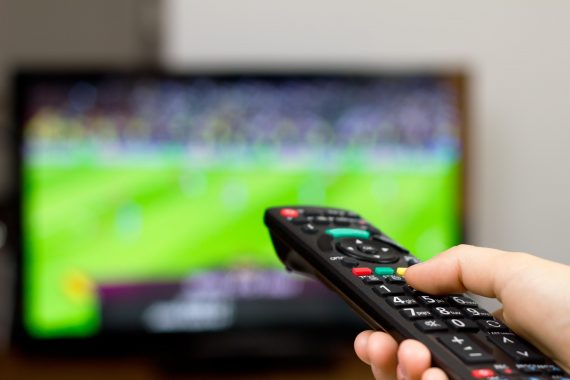

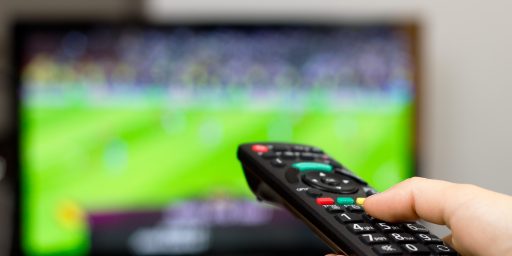
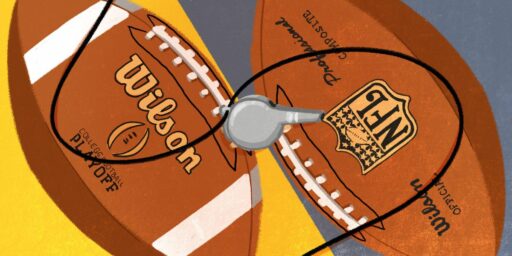
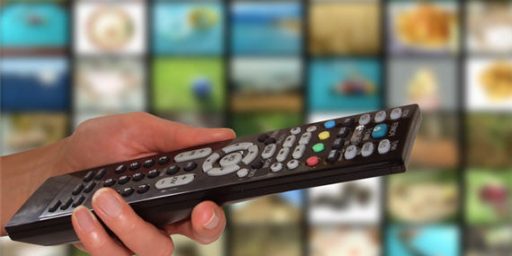
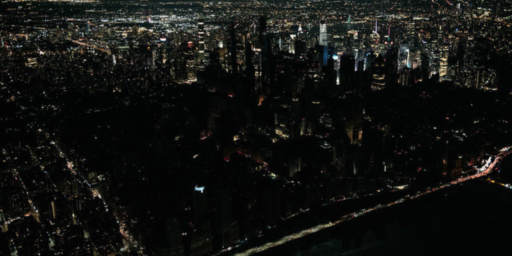
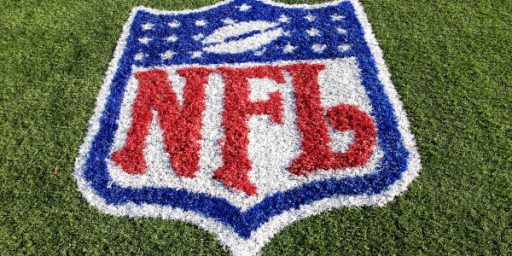
I hate to mention my geezer card, but I remember all of the debates from 40 years ago. It was quite volatile, even though it was decades before sports radio and sports blogs. The NFL was quite concerned about playing games to empty stadia.
I have DirecTV and the Sunday Ticket at my house.
I got into a huge fight with DTV because they blacked out the Miami/KC game last week…I live in Connecticut…way, way, way, outside the viewing area.
Result…I got the equivalent of a free year of Sunday Ticket.
I’m pretty sure THAT’S the reason the rules were changed.
@John Peabody:
Yeah…it’s been an issue forever.
I remember that when I worked in TV in Miami in the late 80’s we would sometimes buy out the remaining tickets at the blackout deadline and donate them to charities so that we could air the games.
The design of NFL stadiums varies widely based on how many people they think they can draw…from Jerry Jones behemoth of 105,000 (including standing)…to many that are around 65,000. No one wants a stadium full of people dressed as empty seats.
I think the blackout rule is stupid but don’t see how it’s any of the FCC’s business. The NFL is a private good. Further, don’t the League’s contracts with the broadcast networks specify the blackout rule as part of the licensing rights? How would the networks have a right to air games that the League blacks out?
@James Joyner:
Broadcast media and the Internet are not. What gets distributed by regulated telecommunications monopolies, and how, is certainly the FCC’s business.
@DrDaveT:
Sure. They could rule that pro football is too violent to be broadcast over the airwaves. They could rule that showing too much cheerleader cleavage before 9pm is inappropriate. But what business is it of the federal government whether NBC shows the Broncos or the Jaguars?
The NFL, which owns the context, has decided that it only wants to put games on free TV if the stadium is sold out, seeing their TV partner broadcast as a rival good in the local market. I think that’s short-sighted but it’s their call to make. Why is the FCC involved in that?
Could the FCC decide that “Mad Men” is too good to cancel and therefore AMC needs to keep making it another three seasons? That it’s complete BS that “Family Guy” and “Good Wife” are on the same time as “Sunday Night Football” and order the networks to rearrange their schedules?